实验五
task1.1
#include <stdio.h>
#define N 5
void input(int x[], int n);
void output(int x[], int n);
void find_min_max(int x[], int n, int *pmin, int *pmax);
int main() {
int a[N];
int min, max;
printf("录入%d个数据:\n", N);
input(a, N);
printf("数据是: \n");
output(a, N);
printf("数据处理...\n");
find_min_max(a, N, &min, &max);
printf("输出结果:\n");
printf("min = %d, max = %d\n", min, max);
return 0;
}
void input(int x[], int n) {
int i;
for(i = 0; i < n; ++i)
scanf("%d", &x[i]);
}
void output(int x[], int n) {
int i;
for(i = 0; i < n; ++i)
printf("%d ", x[i]);
printf("\n");
}
void find_min_max(int x[], int n, int *pmin, int *pmax) {
int i;
*pmin = *pmax = x[0];
for(i = 1; i < n; ++i)
if(x[i] < *pmin)
*pmin = x[i];
else if(x[i] > *pmax)
*pmax = x[i];
}
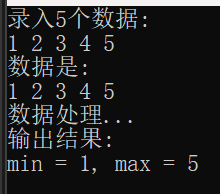
找到数组中的最大值和最小值
都指向x[0]的地址
task1.2
#define _CRT_SECURE_NO_WARNINGS #include<stdio.h> #include<stdlib.h> #include <stdio.h> #define N 5 void input(int x[], int n); void output(int x[], int n); int* find_max(int x[], int n); int main() { int a[N]; int* pmax; printf("录入%d个数据:\n", N); input(a, N); printf("数据是: \n"); output(a, N); printf("数据处理...\n"); pmax = find_max(a, N); printf("输出结果:\n"); printf("max = %d\n", *pmax); return 0; } void input(int x[], int n) { int i; for (i = 0; i < n; ++i) scanf("%d", &x[i]); } void output(int x[], int n) { int i; for (i = 0; i < n; ++i) printf("%d ", x[i]); printf("\n"); } int* find_max(int x[], int n) { int max_index = 0; int i; for (i = 1; i < n; ++i) if (x[i] > x[max_index]) max_index = i; return &x[max_index]; }
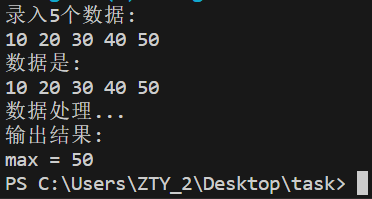
1.find_max作用是返回数据中的最大值
2.可以
task2.1
#include <stdio.h> #define N 5 void input(int x[], int n); void output(int x[], int n); int *find_max(int x[], int n); int main() { int a[N]; int *pmax; printf("录入%d个数据:\n", N); input(a, N); printf("数据是: \n"); output(a, N); printf("数据处理...\n"); pmax = find_max(a, N); printf("输出结果:\n"); printf("max = %d\n", *pmax); return 0; } void input(int x[], int n) { int i; for(i = 0; i < n; ++i) scanf("%d", &x[i]); } void output(int x[], int n) { int i; for(i = 0; i < n; ++i) printf("%d ", x[i]); printf("\n"); } int *find_max(int x[], int n) { int max_index = 0; int i; for(i = 1; i < n; ++i) if(x[i] > x[max_index]) max_index = i; return &x[max_index]; }
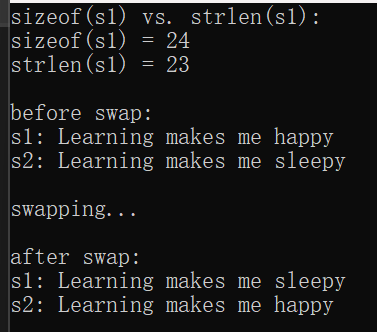
1.长度为23,sizeof(s1)计算的是字符串的长度加'\0',strlen(s1)统计的是字符串实际长度
2.不可以,s1未出现'\0'
3.交换
task2.2
#include <stdio.h> #include <string.h> #define N 80 int main() { char *s1 = "Learning makes me happy"; char *s2 = "Learning makes me sleepy"; char *tmp; printf("sizeof(s1) vs. strlen(s1): \n"); printf("sizeof(s1) = %d\n", sizeof(s1)); printf("strlen(s1) = %d\n", strlen(s1)); printf("\nbefore swap: \n"); printf("s1: %s\n", s1); printf("s2: %s\n", s2); printf("\nswapping...\n"); tmp = s1; s1 = s2; s2 = tmp; printf("\nafter swap: \n"); printf("s1: %s\n", s1); printf("s2: %s\n", s2); return 0; }
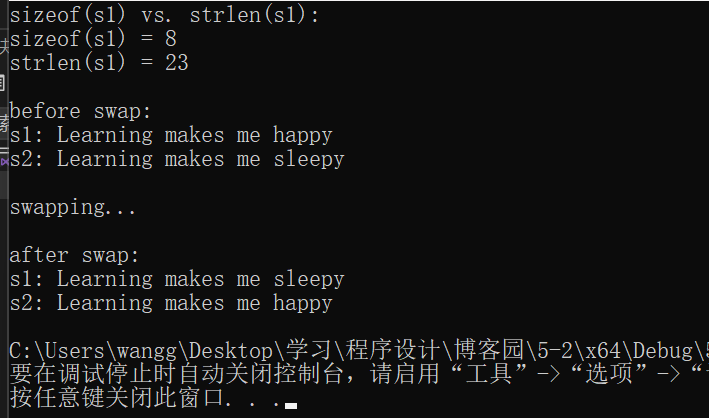
1.长度为23,sizeof(s1)计算的是字符串的长度加'\0',strlen(s1)统计的是字符串实际长度
2.可以
3.交换地址,没有
task3
#include <stdio.h> #include <stdio.h> int main() { int x[2][4] = {{1, 9, 8, 4}, {2, 0, 4, 9}}; int i, j; int *ptr1; // 指针变量,存放int类型数据的地址 int(*ptr2)[4]; // 指针变量,指向包含4个int元素的一维数组 printf("输出1: 使用数组名、下标直接访问二维数组元素\n"); for (i = 0; i < 2; ++i) { for (j = 0; j < 4; ++j) printf("%d ", x[i][j]); printf("\n"); } printf("\n输出2: 使用指向元素的指针变量p间接访问二维数组元素\n"); for (ptr1 = &x[0][0], i = 0; ptr1 < &x[0][0] + 8; ++ptr1, ++i) { printf("%d ", *ptr1); if ((i + 1) % 4 == 0) printf("\n"); } printf("\n输出3: 使用指向一维数组的指针变量q间接访问二维数组元素\n"); for (ptr2 = x; ptr2 < x + 2; ++ptr2) { for (j = 0; j < 4; ++j) printf("%d ", *(*ptr2 + j)); printf("\n"); } return 0; }
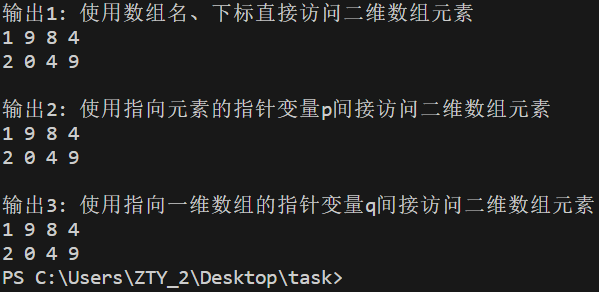
task4.1
#define _CRT_SECURE_NO_WARNINGS #include<stdio.h> #include<stdlib.h> #define N 80 void replace(char* str, char old_char, char new_char); // 函数声明 int main() { char text[N] = "c programming is difficult or not, it is a question."; printf("原始文本: \n"); printf("%s\n", text); replace(text, 'i', '*'); // 函数调用 注意字符形参写法,单引号不能少 printf("处理后文本: \n"); printf("%s\n", text); system("pause"); return 0; } // 函数定义 void replace(char* str, char old_char, char new_char) { int i; while (*str) { if (*str == old_char) *str = new_char; str++; } }

1.将一个指定字符换成另一个指定字符
2可以
task4.2
#define _CRT_SECURE_NO_WARNINGS #include<stdio.h> #include<stdlib.h> #define N 80 void str_trunc(char* str, char x); int main() { char str[N]; char ch; printf("输入字符串: "); gets(str); printf("输入一个字符: "); ch = getchar(); printf("截断处理...\n"); str_trunc(str, ch); printf("截断处理后的字符串: %s\n", str); system("pause"); } void str_trunc(char* str, char x) { while (*str) { if (*str == x) *str = 0; str++; } return 0; }

task5.1
#include <stdio.h> #include <string.h> void sort(char *name[], int n); int main() { char *course[4] = {"C Program", "C++ Object Oriented Program", "Operating System", "Data Structure and Algorithms"}; int i; sort(course, 4); for (i = 0; i < 4; i++) printf("%s\n", course[i]); return 0; } void sort(char *name[], int n) { int i, j; char *tmp; for (i = 0; i < n - 1; ++i) for (j = 0; j < n - 1 - i; ++j) if (strcmp(name[j], name[j + 1]) > 0) { tmp = name[j]; name[j] = name[j + 1]; name[j + 1] = tmp; } }
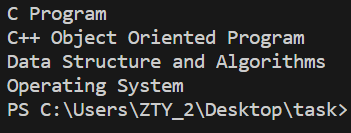
task5.2
#include <stdio.h> #include <string.h> void sort(char *name[], int n); int main() { char *course[4] = {"C Program", "C++ Object Oriented Program", "Operating System", "Data Structure and Algorithms"}; int i; sort(course, 4); for (i = 0; i < 4; i++) printf("%s\n", course[i]); return 0; } void sort(char *name[], int n) { int i, j, k; char *tmp; for (i = 0; i < n - 1; i++) { k = i; for (j = i + 1; j < n; j++) if (strcmp(name[j], name[k]) < 0) k = j; if (k != i) { tmp = name[i]; name[i] = name[k]; name[k] = tmp; } } }
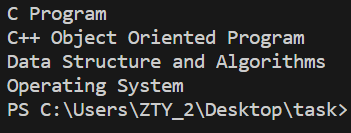
task6
#define _CRT_SECURE_NO_WARNINGS #include<stdio.h> #include<stdlib.h> #include <stdio.h> #include <string.h> #define N 5 int check_id(char* str); // 函数声明 int main() { char* pid[N] = { "31010120000721656X", "330106199609203301", "53010220051126571", "510104199211197977", "53010220051126133Y" }; int i; for (i = 0; i < N; ++i) if (check_id(pid[i])) // 函数调用 printf("%s\tTrue\n", pid[i]); else printf("%s\tFalse\n", pid[i]); return 0; } // 函数定义 // 功能: 检查指针str指向的身份证号码串形式上是否合法。 // 形式合法,返回1,否则,返回0 int check_id(char* str) { if (strlen(str) != 18) return 0; else while (*str) { int i = 0, count = 0; for (i = 0; i < strlen(str); i++) { if ((str[i] >= 48 && str[i] <= 57) || str[i] == 'X') count++; } if (count == 18) return 1; else return 0; } }
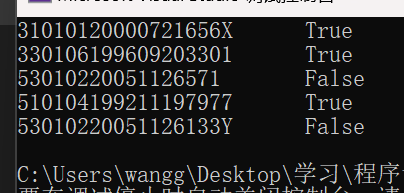
task7
#define _CRT_SECURE_NO_WARNINGS #include<stdio.h> #include<stdlib.h> #define N 80 void encoder(char* str); // 函数声明 void decoder(char* str); // 函数声明 int main() { char words[N]; printf("输入英文文本: "); gets(words); printf("编码后的英文文本: "); encoder(words); // 函数调用 printf("%s\n", words); printf("对编码后的英文文本解码: "); decoder(words); // 函数调用 printf("%s\n", words); return 0; } /*函数定义 功能:对s指向的字符串进行编码处理 编码规则: 对于a~z或A~Z之间的字母字符,用其后的字符替换; 其中,z用a替换,Z用A替换 其它非字母字符,保持不变 */ void encoder(char* str) { int i = 0; for (i = 0; i < strlen(str); i++) { if ((str[i] >= 'a' && str[i] <= 'y') || (str[i] >= 'A' && str[i] <= 'Y')) str[i] = str[i] + 1; else if (str[i] == 'z') str[i] = 'a'; else if (str[i] == 'Z') str[i] = 'A'; else str[i] = str[i]; } } /*函数定义 功能:对s指向的字符串进行解码处理 解码规则: 对于a~z或A~Z之间的字母字符,用其前面的字符替换; 其中,a用z替换,A用Z替换 其它非字母字符,保持不变 */ void decoder(char* str) { int i = 0; for (i = 0; i < strlen(str); i++) { if ((str[i] >= 'b' && str[i] <= 'z') || (str[i] >= 'B' && str[i] <= 'Z')) str[i] = str[i] - 1; else if (str[i] == 'a') str[i] = 'z'; else if (str[i] == 'A') str[i] = 'Z'; } }
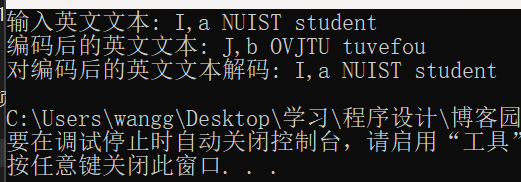
task8
#include <stdio.h> int main(int argc, char *argv[]) { int i; for(i = 1; i < argc; ++i) printf("hello, %s\n", argv[i]); return 0; }
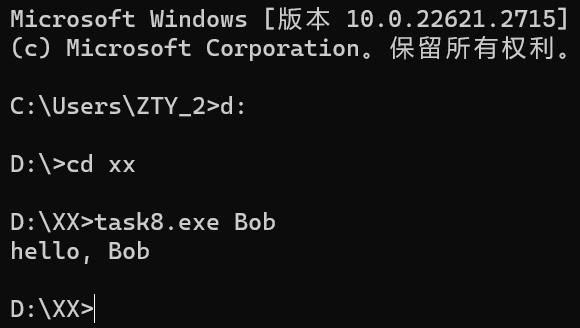




 浙公网安备 33010602011771号
浙公网安备 33010602011771号